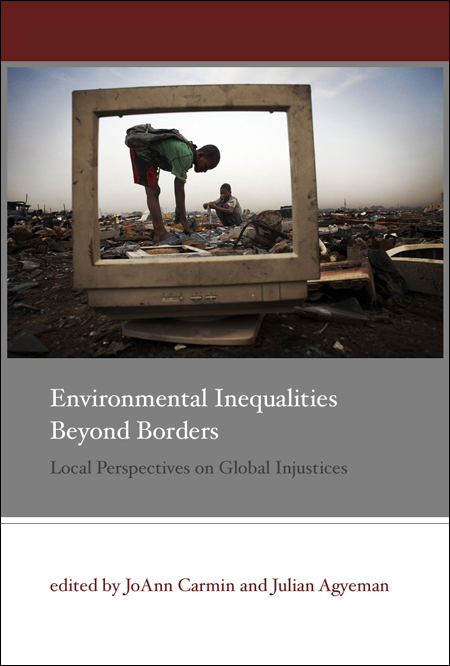Environmental Inequalities Beyond Borders: Local Perspectives on Global Injustices
 Published by: The MIT Press
Published by: The MIT PressRelease Date: April 4, 2011
Pages: 320
ISBN13: 978-0262515870
Buy the Book: Amazon, Barnes & Noble, IndieBound, Books-A-Million, The MIT Press
Overview
Multinational corporations often exploit natural resources or locate factories in poor countries far from the demand for the products and profits that result. Developed countries also routinely dump hazardous materials and produce greenhouse gas emissions that have a disproportionate impact on developing countries. This book investigates how these and other globalized practices exact high social and environmental costs as poor, local communities are forced to cope with depleted resources, pollution, health problems, and social and cultural disruption.
Case studies drawn from Africa, Asia, the Pacific Rim, and Latin America critically assess how diverse types of global inequalities play out on local terrains. These range from an assessment of the pros and cons of foreign investment in Fiji to an account of the work of transnational activists combating toxic waste disposal in Mozambique. Taken together, the chapters demonstrate the spatial disconnect between global consumption and production on the one hand and local environmental quality and human rights on the other. The result is a rich perspective not only on the ways industries, governments, and consumption patterns can further entrench existing inequalities but also on how emerging networks and movements can foster institutional change and promote social equality and environmental justice.
Reviews
“Carmin and Agyeman have edited an excellent and broad-ranging collection on the relationship between global practices and local conditions. The contributors offer new empirical studies of environmental injustices and resistance, from South Africa to China and Fiji to Ecuador. Together, they advance our understanding of the experience and practice of environmental justice in important new transnational directions. Comprehensive and innovative.”
—David Schlosberg , Professor of Politics and International Relations, University of Sydney
“Global production and consumption chains are vastly increasing the distance between those who benefit from and those who have to deal with the impacts of mining, disposal, and industrial pollution. Meanwhile, global inequality is growing and morphing, and institutions are struggling to cope. Carmin and Agyeman’s collection represents a substantial contribution to our understanding of this new ‘spatial injustice.’”
—J. Timmons Roberts, Director, Center for Environmental Studies, Brown University, and author of A Climate of Injustice
“This book is a shining example of engaged scholarship. Carmin and Agyeman aim to advance our understanding of, and ability to act upon, environmental inequalities around the world, and they achieve this twofold objective nicely. In my field of urban and regional planning, the role of institutions that the book highlights is increasingly key, and I see this book as a solid contribution to my field as well as to sociology, political science, anthropology, international studies, ethnic studies, and environmental health studies.”
—Keith Pezzoli, Urban Studies and Planning Program, University of California, San Diego
“[A] far-reaching and deeply engaging look at…issues in international environmental law.”
—Luke Boughen, International Environmental Agreements
“With valuable practical and theoretical contributions, the global scope of this volume is admirable. The book well serves its primary audience: scholars and development professionals interested in justice-oriented dimensions of globalization and environmental inequality.”
—Human Ecology